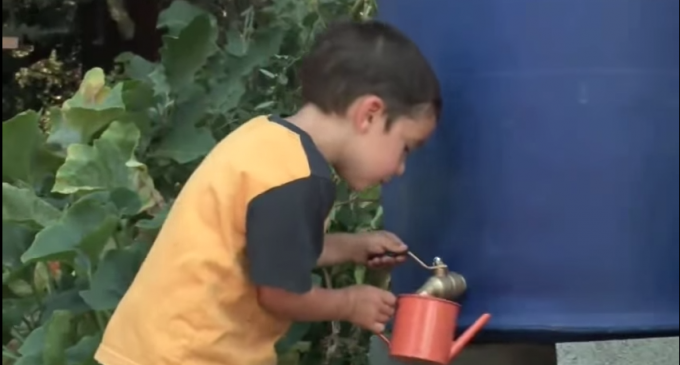
If you’re looking to save on your water bill and become a bit more self-sufficient you might consider building a rainwater collection system.
The video on the next page provides excellent instruction for a simple, single-barrel system that anyone can build.
Sadly, you must check with local laws before building such a system as some cities and towns have labeled rainwater collections as ‘stealing water’.
SEE NEXT PAGE:

Just bought a kit to convert a trash barrel into a rain barrel Wish I had seen this first. But it will still help a bit. Good video.
Don’t do this in Oregon, you will go to jail.
CANT DO IT ANY WHERE BECAUSE OF CALIFORNIA SAYING NO ACROSS THE U.S DUE TO THE UNIFIED PLUMBING CODE
IN OREGON YOUCAN DO IT IF IT DOESN’T HIT THE GROUND
How can it be stealing water when there are laws, Federal Laws, that require you to control and maintain the quality of water on your property and if it leaves your property it must meet a standard of cleanliness before it can be introduced into a public water source. So collecting water in containers as it falls onto your property and applying it to the ground on your property is just a form of treating the water, according to the requirements of the law. Actually, residences are exempt from the Clean Water Act, Summary of the Clean Water Act
33 U.S.C. §1251 et seq. (1972)
The Clean Water Act (CWA) establishes the basic structure for regulating discharges of pollutants into the waters of the United States and regulating quality standards for surface waters. The basis of the CWA was enacted in 1948 and was called the Federal Water Pollution Control Act, but the Act was significantly reorganized and expanded in 1972. “Clean Water Act” became the Act’s common name with amendments in 1972.
Under the CWA, EPA has implemented pollution control programs such as setting wastewater standards for industry. We have also set water quality standards for all contaminants in surface waters.
The CWA made it unlawful to discharge any pollutant from a point source into navigable waters, unless a permit was obtained. EPA’s National Pollutant Discharge Elimination System (NPDES) permit program controls discharges. Point sources are discrete conveyances such as pipes or man-made ditches. Individual homes that are connected to a municipal system, use a septic system, or do not have a surface discharge do not need an NPDES permit; however, industrial, municipal, and other facilities must obtain permits if their discharges go directly to surface waters.
Didnt someone just get arrested and jailed for collecting rainwater?
the epa wants to control the rain God sends us
How can the EPA charge you for something they dont own ?? oh how soon i forget, we talking bout the scandalous EPA…
I can’t get over some states laws on catching rain water and it being illegal. .
LOL – we have no rain in CA – and those who have it (Northern CA) won’t share it. Interesting, isn’t it? That’s Love of fellow man for you.